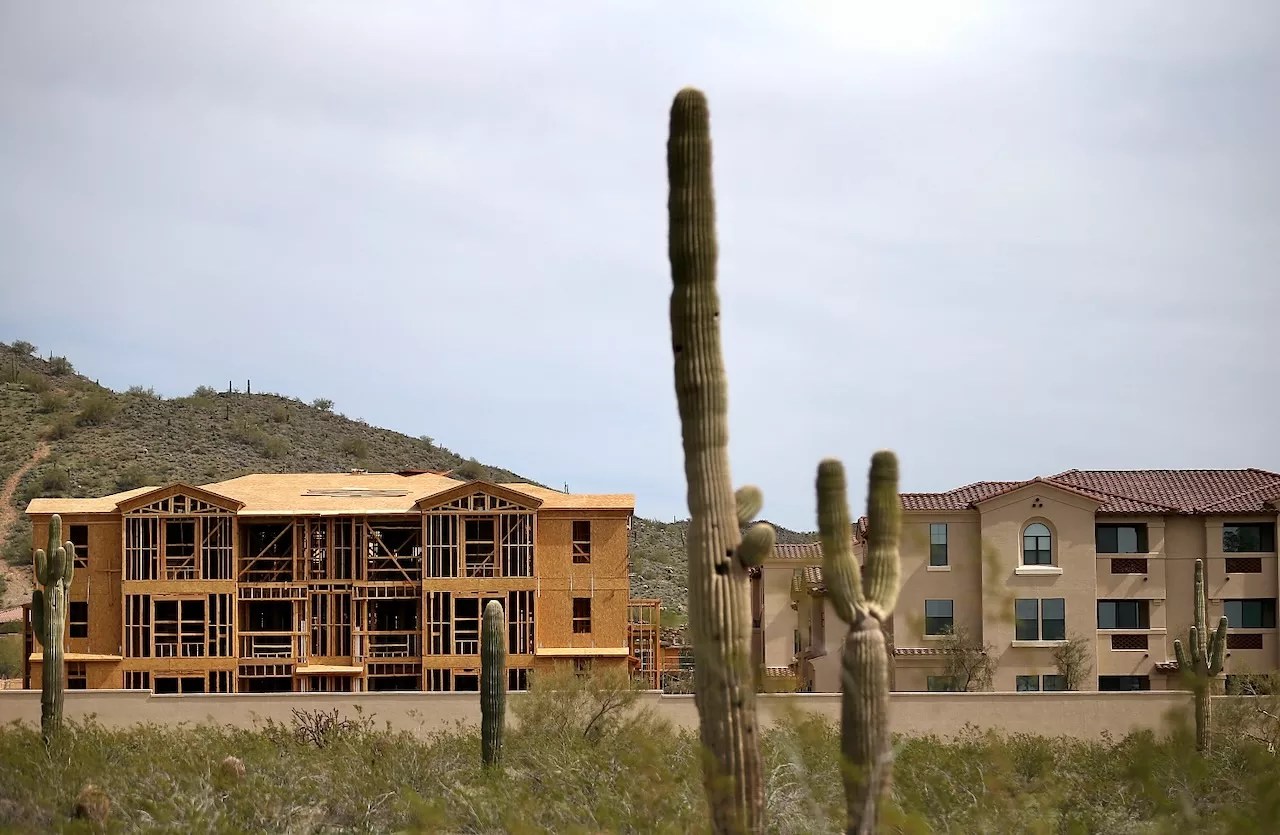
Justin Sullivan/Getty Images

Audio By Carbonatix
Daniel Lopez, 24, teaches social studies in the Creighton School District. He’s been on his middle-school job for three years and has a master’s degree, but he can’t afford a home of his own. Right now, he lives in an apartment that he shares with a coworker.
According to an ASU study, middle-class workers like Lopez – as well as nurses, teachers, police officers, firefighters and construction workers – are the new face of Phoenix’s housing shortage.
It takes a salary of $123,752 to afford the median home price of $460,000 in greater Phoenix, and even the median rent for a two-bedroom apartment, $1,671, is out of reach for many, the study says.
“Teaching for a lot of people promises this middle-class lifestyle, which in some ways is correct – we have insurance, we have all these benefits,” Lopez said. “But when it comes to housing, a lot of us don’t get paid enough to afford rent anywhere on our own.”
Lopez said most teachers in his district can’t afford to buy a home nearby and make a 45- to 60-minute commute to work. “I think if I was in my parents’ generation, I might be looking for a house to buy,” Lopez said. “But that doesn’t seem to be an option for me.”
The Morrison Institute for Public Policy, a research arm of ASU, presented its findings about the state of affordable housing in Phoenix, and Arizona as a whole, during a public webinar in January.
Alison Cook-Davis, associate director of research at the Morrison Institute, reported that Arizona is short 270,000 housing units of all affordability ranges, with only 26 rentals for every 100 extremely low-income residents.
Cook-Davis listed many barriers that have contributed to the lack of affordable housing. Rising labor and construction costs helped trigger the shortage, but restrictive zoning has also slowed progress. According to a Morrison Institute report from 2022, about 50 percent of Arizona land is zoned single-family, which limits the space that can be used to build large, affordable-housing complexes.
Measures to rezone areas from single-family to multifamily take time. According to the same report, some developers claim such rezoning measures have taken up to two years, which not only hurts residents who need housing but can also put developers at risk of losing their funding. In order for developers to use the Low-Income Housing Tax Credit, an invaluable resource for affordable-housing builders, the project must be completed in two years.

A worker builds a new home in Phoenix, where it takes a salary of 3,752 to afford the median home price of 0,000. That’s often out of reach for middle-class workers.
Justin Sullivan/Getty Images
Public pushback stalls affordable housing
The ASU report also pointed to organized pushback against new housing development, particularly affordable housing. The U.S. Department of Housing and Urban Development defines affordable housing as housing for which the occupant does not pay more than 30 percent of their gross income.
In the January webinar, Amy St. Peter, deputy executive director of the Maricopa Association of Governments, said that in 2021 at least 30 developments were delayed or canceled because of community opposition to zoning issues or political backlash.
Sally Schwenn, Arizona market president of Gorman & Company, one of the largest affordable housing developers in the state, pointed to similar struggles with pushback from the public.
“A lot of it is just a misunderstanding of what affordable housing is,” she told Phoenix New Times. Many people mistakenly think “you’re bringing in all these bad folks and a lot of crime or drugs,” she added.
Phoenix’s housing crisis didn’t happen overnight. The city released its Housing Phoenix plan, a multistep process aimed at increasing affordable housing options, in 2019. The plan’s primary goal was to “create or preserve 50,000 homes by 2030.”
The city’s population, however, has been growing rapidly for years, far outstripping new housing stock. In the last 30 years, Phoenix produced only 220,000 new housing units as the population increased by 820,000, the plan says.
The city releases quarterly reports to chart its progress. The latest report, October to December 2023, shows that 35,590 homes total have been either created or preserved so far, but only 2,418 of those are considered new affordable units.
Gorman received $15 million from the Choice Neighborhood Implementation grant, a federal initiative, which is being added to a pool of $350 million that will be going to four separate Gorman affordable housing developments in Arizona, Schwenn said.
“We are able to, through these programs, obtain funding that other straight affordable housing projects might not get to help leverage these projects,” Schwenn said.
Though pandemic funding like the American Rescue Plan Act of 2021 is drying up, Schwenn said she remains hopeful because of recent changes in the housing market. She has seen land prices soften, with more negotiating room than before. Construction material prices have leveled off, and Gorman isn’t struggling as much to find construction workers.
“We’re starting construction on two other projects now, and we’re not as worried about what our construction timeline is going to be on those,” Schwenn said.
Lopez, however, isn’t as optimistic about his future housing prospects. He said he could afford housing in Avondale, where he grew up, but that would place him an hour away from work. Such a distance would bite hard, because teachers want to be active in their communities and in the lives of their students, he said.
Lopez hopes to get into a stable housing situation some day. But when his current lease ends, he’ll go back to sharing space – this time with three friends in a house in Tempe.